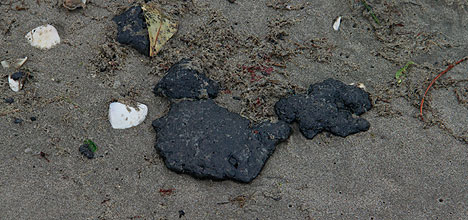The Bay of Plenty has dodged a bullet with the oil from the stricken ship Rena, says a Waikato oceanographer.
Dr Willem de Lange says oil from the Rena is far better being washed up on the beaches and rocky coastline, than in areas where it will do permanent damage such as estuaries.
Oil started washing up on Bay of Plenty beaches on October 10.
The University of Waikato professor has been studying the effect of winds and currents on the dispersal of 350 tonnes of oil, which leaked from the ship after it crashed into Astrolabe reef on October 5.
'With Tauranga, so much oil in such a small place tends to overwhelm the natural ecosystem for a while, but the ecosystem is equipped to handle this.
'Oil floats on top of the water so it affects the upper parts of the tidal reaches, so high up on the beaches, on rocks and into estuaries.”
Oil from Rena first began to hit Bay of Plenty beaches on October 10, and while the beach is open, they continue to be monitored and clean ups are continuing on the worst affected beaches.
Willem says sometimes the best thing to do with oil spills is leave them alone.
He says where the oil goes depends on the wind, waves, tides and the current.
'With rocky coastline and beaches, given time the oil will be eaten by bacteria.”
He says thankfully oil from Rena has so far had a relatively low impact on the environment and is yet to be found in any estuaries in large quantities.
'The problem is when oil settles in estuaries. Estuaries are very difficult to clean and don't have an environment that aids biodegradation.
'When oil gets into the vegetation in estuaries it's almost impossible to clean and any attempt to do so destroys the environment and the wildlife.”
Willem says unlike on beaches and on rocky coastline, where oil will be exposed to microbes in seawater and sunlight – both key in biodegradation – estuaries do not have an environment conducive to biodegradation and will be heavily affected by any oil that reaches them.
'The Rena spill has been highly visible and highly emotive, but it's not going to have a huge environmental impact.
'Oil spills are not uncommon but it's not often they happen on prime coastline.”



3 comments
BUT
Posted on 19-11-2011 13:04 | By Capt_Kaveman
it is inside the harbour in small bits and the enterance should have been boomed at incoming tides but never was due to the fact the industry that caused the prob wants to make more $ shame on the port of Tga for not making this happen
Facts Tell The Story
Posted on 19-11-2011 13:35 | By tabatha
@Capt_Kaveman perhaps this person does not realise that control of booms etc was more in the hands of Maritime New Zealand (MNZ) rather than the Harbour Board. What is very tiring is the couch critics who I wonder how much they did to help. Can not help remembering this person, Capt_Kaveman, spent a lot of time picking fault.
Oil booms
Posted on 19-11-2011 15:04 | By Murray.Guy
unfortunately oil booms are not effective in areas where the current flow exceeds walking pace (my walking pace). Trapped oil is washed off and swept under the booms to continue it's destructive journey.
Leave a Comment
You must be logged in to make a comment.